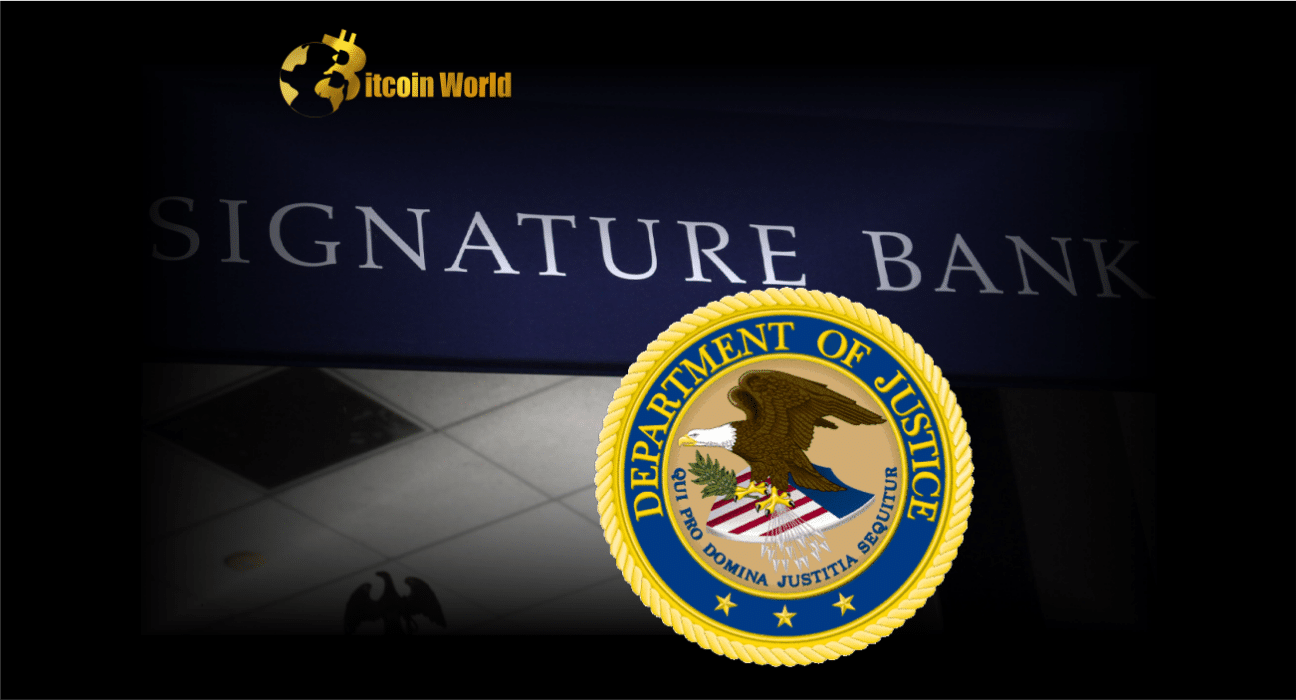The crypto world and traditional finance are once again intertwined in a high-stakes drama. This time, it’s Signature Bank, a financial institution known for its embrace of cryptocurrency clients, finding itself in the crosshairs of federal investigators. Let’s dive into the unfolding story of the Department of Justice (DOJ) investigation into Signature Bank and what it means for the future of crypto and banking.
What’s Happening at Signature Bank?
According to a Bloomberg report, citing sources familiar with the matter, both the US Department of Justice in Washington and the Manhattan U.S. Attorney’s Office are probing Signature Bank for potential lapses in its anti-money laundering (AML) surveillance. The core concern? Whether the bank adequately monitored transactions to prevent money laundering, particularly concerning its cryptocurrency clientele.
This investigation isn’t happening in a vacuum. It follows the dramatic closure of Signature Bank by New York state regulators on March 12th, a move announced by the Federal Reserve. Signature Bank was notable for being crypto-friendly, serving a significant number of businesses in the digital asset space.
Why is the DOJ Investigating?
The DOJ’s interest reportedly centers on whether Signature Bank had sufficient controls in place to detect and prevent illicit financial activities. Specifically, investigators are scrutinizing:
- Inadequate Surveillance: The investigation is looking into whether Signature Bank’s surveillance systems were robust enough to monitor transactions effectively, especially those linked to cryptocurrency clients.
- Freshly Formed Accounts: Investigators are examining newly opened accounts for signs of suspicious activity and potential unlawful behavior.
- Money Laundering Prevention: The overarching goal of the investigation is to determine if Signature Bank failed to adequately prevent money laundering through its platform.
It’s also worth noting that the U.S. Securities and Exchange Commission (SEC) is reportedly conducting its own examination of Signature Bank, adding another layer of regulatory scrutiny. [Citation needed] [More citation is required]
Who is Involved?
Several key agencies and offices are involved in this developing situation:
- U.S. Department of Justice (DOJ): Leading the criminal investigation into potential money laundering control failures.
- Manhattan U.S. Attorney’s Office: Working in conjunction with the DOJ on the investigation, focusing on potential criminal charges.
- U.S. Securities and Exchange Commission (SEC): Conducting an examination, possibly focused on securities-related aspects and regulatory compliance.
- Federal Reserve: Announced the closure of Signature Bank by New York state regulators, indicating concerns about the bank’s stability and practices.
- Federal Deposit Insurance Corporation (FDIC): Appointed as receiver after Signature Bank’s closure, managing the bank’s assets and ensuring depositors are protected.
- New York State Regulators: Made the decision to close Signature Bank, highlighting regulatory concerns.
When contacted by Bloomberg, representatives from all these agencies – DOJ, SEC, Manhattan U.S. Attorney’s Office, and FDIC – declined to comment, which is typical in ongoing investigations. This silence only adds to the intrigue and speculation surrounding the case.
Why Does This Matter to the Crypto World?
The Signature Bank investigation is significant for several reasons, particularly for the cryptocurrency industry:
- Increased Regulatory Scrutiny: This investigation signals a continued and potentially intensified focus on regulatory compliance within the crypto sector. Banks dealing with crypto clients are under pressure to demonstrate robust AML and Know Your Customer (KYC) practices.
- Impact on Crypto-Friendly Banks: The scrutiny on Signature Bank could make other banks hesitant to engage with cryptocurrency businesses, potentially limiting banking options for the industry.
- Confidence in Crypto Transactions: Allegations of inadequate surveillance and potential money laundering can erode public trust in cryptocurrency transactions and the platforms that facilitate them.
- Wider Regulatory Crackdown? This investigation, coupled with other regulatory actions, could be interpreted as part of a broader effort to bring the cryptocurrency industry under stricter control.
Key Takeaways and Actionable Insights
For businesses and individuals involved in cryptocurrency, the Signature Bank investigation serves as a stark reminder of the importance of regulatory compliance and robust AML practices.
Actionable Insights:
- Enhanced Compliance is Crucial: Cryptocurrency businesses must prioritize building and maintaining strong AML and KYC programs. This includes transaction monitoring, customer due diligence, and reporting suspicious activities.
- Transparency is Key: Operating transparently and cooperating with regulators is essential for building trust and ensuring long-term sustainability in the crypto space.
- Diversify Banking Relationships: Crypto businesses should consider diversifying their banking relationships to mitigate risks associated with regulatory actions against a single financial institution.
- Stay Informed: Keep abreast of evolving regulations and enforcement actions in the cryptocurrency space to adapt and remain compliant.
Looking Ahead
The DOJ’s investigation into Signature Bank is still in its early stages, and it remains to be seen what the findings will be. However, one thing is clear: the intersection of cryptocurrency and traditional finance is under intense regulatory examination. This case will likely set precedents for how banks manage crypto clients and how regulators oversee this rapidly evolving industry.
As the investigation unfolds, the crypto community, financial institutions, and regulators will be watching closely. The outcome could have significant implications for the future of cryptocurrency banking and the broader regulatory landscape of digital assets.
Disclaimer: The information provided is not trading advice, Bitcoinworld.co.in holds no liability for any investments made based on the information provided on this page. We strongly recommend independent research and/or consultation with a qualified professional before making any investment decisions.


